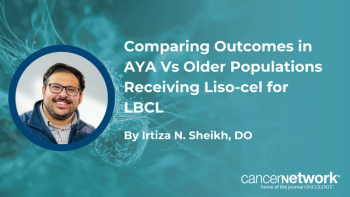
Oncology NEWS International
- Oncology NEWS International Vol 17 No 6
- Volume 17
- Issue 6
New GnRH blocker degarelix quickly suppresses levels of testosterone
ORLANDO-In a phase III study, the investigational GnRH blocker degarelix (Ferring Pharmaceuticals) significantly reduced testosterone levels within 3 days in more than 96% of study patients, Laurence Klotz, MD, of the University of Toronto, reported at AUA 2008. The fast effect on testosterone levels was close to the immediate effect achieved with surgery, he said.
ORLANDO-In a phase III study, the investigational GnRH blocker degarelix (Ferring Pharmaceuticals) significantly reduced testosterone levels within 3 days in more than 96% of study patients, Laurence Klotz, MD, of the University of Toronto, reported at AUA 2008. The fast effect on testosterone levels was close to the immediate effect achieved with surgery, he said.
The 12-month randomized, open-label, parallel-group study compared monthly subcutaneous administration of degarelix with monthly injection of the LHRH agonist leuprolide depot 7.5 mg in hormone-dependent prostate cancer patients. The degarelix patients received 240 mg at baseline and then were randomized to receive 80 or 160 mg monthly.
By day 3, testosterone levels were suppressed to ≤ 0.5 ng/mL in 96.1% of patients in the degarelix arms vs 0% in the leuprolide arm. By day 14, 100% of degarelix patients achieved testosterone suppression to ≤ 0.5 ng/mL vs 18.2% on leuprolide. After 14 days, PSA levels had declined in the degarelix-treated patients by a median of 64% vs 18% for leuprolide.
Articles in this issue
over 17 years ago
Who’s responsible for safety of outsourced drugs?over 17 years ago
Evaluating lung cancer response to therapy: Thinking beyond RECISTover 17 years ago
NELSON trial sails on toward final results in 2015over 17 years ago
Novel breast probe reduces repeat surgeriesover 17 years ago
Radioactive microspheres benefit liver met ptsover 17 years ago
INTORACT trial of Torisel/Avastin in RCC is initiatedover 17 years ago
New codes needed for chronically ill ptsNewsletter
Stay up to date on recent advances in the multidisciplinary approach to cancer.













































